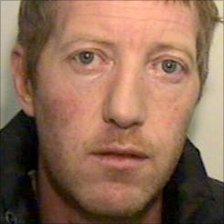Murder victim Clare Wood's father backs disclosure plan
- Published
The father of murder victim Clare Wood, who was killed by her former partner, is backing a proposal for police to disclose offenders' details.
The Victims' Commissioner Louise Casey is mounting a campaign called Clare's law to allow people to find out whether new partners have a violent past.
Ms Wood, 36, of Salford, was strangled by George Appleton, whom she met through Facebook in February 2009.
Her father Michael Brown said domestic abuse in the UK was "epidemic".
Appleton had a history of violence against women, including knifepoint kidnapping.
Ms Wood had made several complaints to police about her partner, who was found hanged in a derelict pub six days after her murder.
An investigation by the Independent Police Complaints Commission later criticised failures in the way Greater Manchester Police had handled Ms Wood's allegations that Appleton, of Adelphi Court, Salford, had harassed, assaulted and threatened to kill her.
'A scandal'
At her inquest, Bolton Coroner Jennifer Leeming, who recorded a verdict of unlawful killing by strangulation, backed a call by the Association of Chief Police Officers for partners to have information about violent offenders disclosed to them.
Ms Wood's father Michael Brown said: "Facts and the statistics in this country of domestic abuse are at epidemic proportions.

Appleton had a history of violence, including a knifepoint kidnapping
"I would like to see the ladies of this country get a bit more protection, that I didn't get for my daughter.
"The year my daughter died, there were three ladies killed in Manchester, including my daughter within a nine-month period and I think it's a scandal."
The Home Office has confirmed that Home Secretary Theresa May is examining the proposals.
Salford MP Hazel Blears, who has travelled to Westminster with Mr Brown, said: "If police have information on a person's violent past they should be able to share that information with all concerned."
She added: "If people do decide to carry on having a relationship with somebody who has behaved violently towards previous partners then at least they do so on an informed basis.
'Unforeseen circumstances'
"It's not right that somebody may be involved with a dangerously violent person and not be given information if they ask for it, as that could help them understand the risk they may be at."
Robert Buckland, MP for Swindon South and member of the Commons Justice Committee, said it was important to debate the "potential unforeseen circumstances" of such a law.
He said: "If information about the bad character or previous convictions of a potential defendant is disclosed generally, I could foresee some lawyers arguing that because his bad character and form is known in the local community that it could prejudice his trial.
"I just think we need to think about these potential unforeseen circumstances in order to get the law absolutely right, and to provide effective protection for vulnerable woman, and indeed men, who get into relationships with dangerous people."
Support organisation Women's Aid says one in four women will be subjected to domestic violence, while one in six men will suffer from it, according to the latest British Crime Survey figures.
- Published24 May 2011
- Published23 May 2011